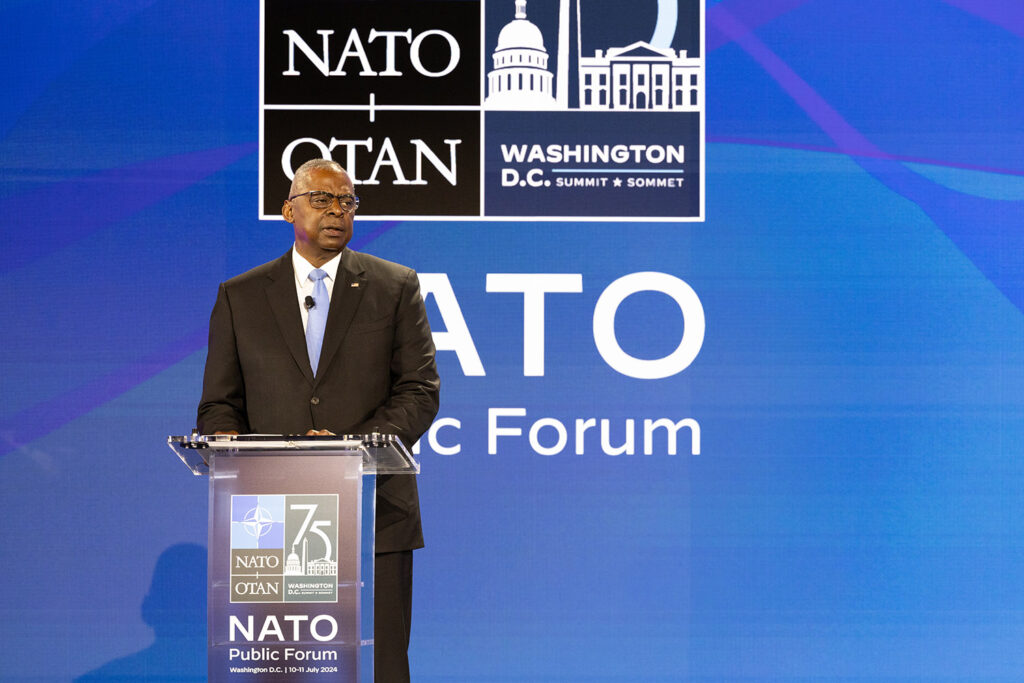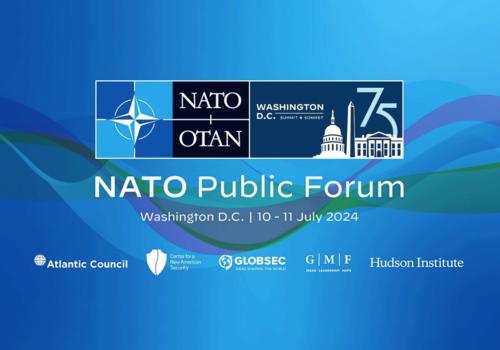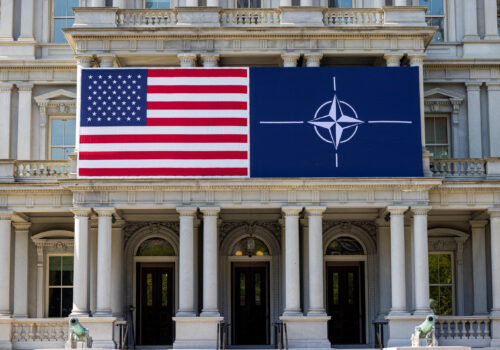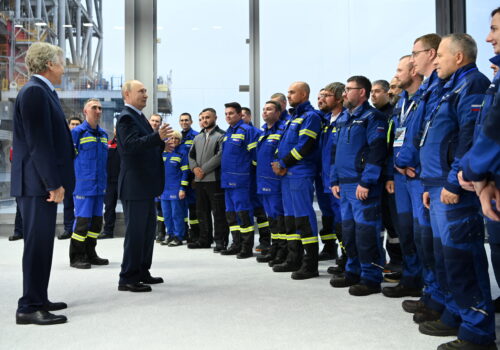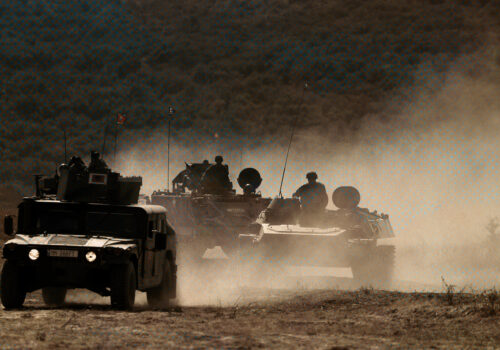Watch the full event
Event transcript
Uncorrected transcript: Check against delivery
Speaker
Lloyd Austin
US Secretary of Defense
Introductory Remarks
Frederick Kempe
President and CEO, Atlantic Council
FREDERICK KEMPE: What a great lineup to start the day—the secretary of state, the supreme allied commander Europe, secretary of defense. It’s really an honor to be here. And thanks to everyone in the room. Good morning to you all, and good afternoon to everyone joining from Europe, and hello to everyone joining from all over the world virtually.
Since its founding in 1949, since NATO’s founding, the United States has played a pivotal role in safeguarding transatlantic security. And the secretary of defense has always been at the center of that. As one of NATO’s founding members, the US has proven to be a critical part of the Alliance’s collective defense and its adaptability to deter evolving threats. And they have been evolving. America has always stood ready to defend and protect the Euro-Atlantic area and beyond, continuing its commitments to the principles of the Washington Treaty. US leadership was pivotal, particularly following Russia’s invasion of Ukraine, mobilizing tremendous support—and you’ve heard more about that today, new Air Force batteries, F-16s—to bolster collective defenses on NATO’s eastern flank, fortifying the commitment to NATO allies, and extending that kind of critical assistance to Ukraine.
So it’s my privilege to introduce a leader who embodies this commitment to transatlantic and, indeed, global security—US Secretary of Defense Lloyd Austin. A graduate of West Point in 1975, Secretary Austin’s career in the US Army spanned more than forty years. Throughout his years of service, he has led the command at the corps, division, battalion, and brigade levels in the US armed forces. Secretary Austin was awarded the Silver Star for his leadership of the US Army’s Third Infantry Division during the invasion of Iraq in 2003.
Before he concluded his uniformed service, Secretary Austin was the commander of the US Central Command from 2013 to 2016, one of our most challenging positions where he was responsible for all the military operations in the Middle East and Afghanistan. Under his leadership, the US Department of Defense has adapted national defense strategies to address the greatest global challenges of our time. And it’s reaffirmed the US commitment to allies and its role as a champion of the rules-based order.
In particular, and this is really important, Secretary Austin’s leadership in the Ukraine defense contact group has proven invaluable in uniting over fifty nations to provide critical military support and security assistance to Ukraine. We saw Vladimir Putin’s message to the NATO summit on Monday this week, with a barrage of more than forty missiles on Ukraine including hitting a children’s hospital. We’ve seen an answer in more—in more air defenses. We’ve seen an answer in the F-16s. We’ve seen an answer in everything else that Secretary Austin and all the allies are doing.
As President Biden has said, the world is at an inflection point with wars in the Middle East, Europe, rising challenge posed to China, biggest defense buildup—peacetime defense buildup in history from China. The secretary of defense is facing more simultaneous challenges than perhaps any predecessor. And we’re lucky to have a man of his pedigree and capability at this historic moment. So with that, ladies and gentlemen, please join me in welcoming to the stage the twenty-eighth US Secretary of Defense, Lloyd Austin.
LLOYD AUSTIN: Well, good morning. It’s really good to be here with all of you and, Fred, thanks for that kind introduction and for all that you’ve done for the Atlantic Council and for bringing us together on a pretty big week.
It’s a huge honor for the United States and President Biden to host this historic summit in Washington, just down the road from the site where the original twelve NATO allies signed the North Atlantic Treaty seventy-five years ago, and together we’re marking one of the great success stories that the world has ever known.
On April 4, 1949, those twelve democracies came together in the wake of two world wars and at the dawn of a new Cold War and they all remembered, as President Truman put it, “the sickening blow of unprovoked aggression.”
And so they vowed to stand together for their collective defense and to safeguard freedom and democracy across Europe and North America. They made a solemn commitment, declaring that an armed attack against one ally would be considered an attack against them all.
Now, that commitment was enshrined in Article 5 of the North Atlantic Treaty. It was the foundation of NATO and it still is.
And on that bedrock we have built the strongest and most successful defensive alliance in human history. Throughout the Cold War, NATO deterred Soviet aggression against Western Europe and prevented a third world war.
In the 1990s, NATO used air power to stop ethnic cleansing in Bosnia and Herzegovina and in Kosovo, and the day after September 11, 2001, when al-Qaeda terrorists attacked our country, including slamming a plane into the Pentagon, NATO invoked Article 5 for the first and only time in its history.
So NATO has always stood by us and we’re going to stand by NATO. Without NATO the past seventy-five years would have been far different and far more dangerous. You know, I’m proud of the ways that NATO continues to strengthen our shared security.
I’m proud of the way that NATO and other—NATO and America’s other alliances and partnerships have grown and strengthened under the leadership of President Biden and I’m especially proud of the way that our allies and partners, including our NATO allies, have met the challenge of Putin’s increasingly aggressive Russia.
In 2014, Putin made an illegal land grab against Ukraine’s Crimea region in eastern Ukraine and since then NATO has undertaken the largest reinforcement of our collective defense in a generation with more forces, more capabilities, and more investment.
Since 2014, our fellow allies have increased their defense spending by an average of 72 percent, accounting for inflation. In February 2022, the world again saw what President Truman called the sickening blow of unprovoked aggression as the Kremlin’s forces invaded the free and sovereign state of Ukraine.
As this administration has made very clear, we will not be dragged into Putin’s reckless war of choice but we will stand by Ukraine as it fights for its sovereignty and security. We will defend every inch of NATO and we will continue to strengthen NATO’s collective defense and deterrence.
In the wake of Putin’s imperial invasion of Ukraine, we bolstered NATO’s forward defense posture with more troops at high readiness, larger exercises, sharper vigilance, and multinational battle group—battle groups in eight countries. NATO is now larger than ever. And our new allies in Finland and Sweden have brought the alliance’s membership to thirty-two. And make no mistake, NATO’s—Putin’s war is not the result of NATO enlargement. Putin’s war is the cause of NATO enlargement.
Over the past three and a half years, we’ve also seen an historic increase in annual defense spending across the alliance by almost eighty billion dollars. All NATO allies have agreed to spend at least 2 percent of their GDP on defense. In 2014, only three allies hit that target. In 2021, only six allies did so. But this year, a record twenty-three NATO allies are meeting the 2 percent defense spending target. Now, our NATO allies are not just spending more on their own defense, they’re also spending more on America’s defense industrial base. That means platforms and munitions built in America. And that’s helping to revitalize production lines across our country and to create good jobs for American workers.
Now, all of that progress is a testament to US leadership and allied solidarity. But it’s also a testament to the leadership of our outgoing secretary general, my good friend Jens Stoltenberg. Throughout a decade of challenge, Jens has guided the Alliance with skill and steel, and we are all deeply, deeply grateful. Now we’re going to keep building on our progress, and we’ve got an ambitious agenda this week. First, we’ll continue to implement NATO’s new family of plans, the most robust since the Cold War. And that will significantly improve our ability to deter and defend against any new threat. Second, we’ll work to endorse a pledge to expand industrial capacity across the alliance. And this will help us scale up military production and send an important long-term signal to industry.
Third, we’ll deepen cooperation in support of Ukraine’s self-defense. We’ll launch a new military effort to help coordinate some aspects of security assistance and training for Ukraine and we’re poised to agree on a new financial pledge to Ukraine. As another sign of our deep commitment to Ukraine’s self-defense, a coalition of countries has been working tirelessly to provide F-16 fighter jets to Ukraine. And today, President Biden, alongside the Dutch and Danish prime ministers, is proud to announce the transfer of F-16s is officially underway, and Ukraine will be flying F-16s this summer.
And finally, we’ll continue to deepen ties with our global partners, especially in the Indo-Pacific. I know that we’re all troubled by China’s support for Putin’s war against Ukraine, but that just reminds us of the profound links between Euro-Atlantic security and Indo-Pacific security. And it sends a message to the world that we are united in our values. So we have a lot to tackle together. But we’re also here to mark this moment. We’re here to strengthen an Alliance that has kept millions of people safe for seventy-five years. And we’re here to reaffirm the ironclad commitment that those twelve leaders made on April 4, 1949: An armed attack against one ally is an attack against us all.
You know, as you heard Fred say, I had a brief forty-one-year career in uniform. I started working with NATO back in 1975, when I was Lieutenant Austin. And I’ve never seen NATO stronger or more united than it is today. And we are determined to keep it that way. You know, I learned a lesson early on in my Army career. And that lesson is that, as a soldier, the last thing that you want to do is to fight alone. So here’s the blunt military reality: America is stronger with our allies. America is safer with our allies. And America is more secure with our allies. And any attempt to undermine NATO only undermines American security.
So we are here this week to strengthen NATO and to strengthen American and allied security for the next seventy-five years. As President Biden has said, our foes and rivals have tried to shatter our unity, but our democracies have stood unwavering. Ladies and gentlemen, that is the legacy that we celebrate. That is the vow that we uphold. And that is the work that we will continue. Thank you very much.
Watch the full event
Further reading
Mon, Jul 8, 2024
Live expertise and behind-the-scenes insight as NATO leaders gather at the Washington summit
New Atlanticist By
As NATO leaders gathered, our experts were on the ground at the summit and NATO Public Forum giving their authoritative, up-to-the-minute analysis and insight.
Tue, Jul 9, 2024
NATO needs a strategy to address Russia’s Arctic expansion
New Atlanticist By
The Washington summit this week provides the perfect moment for the Alliance to forge an even more unified approach to the future of security in the High North.
Mon, Jul 8, 2024
From blueprints to battlefields: How to ensure NATO’s future readiness
New Atlanticist By Luka Ignac
NATO’s success hinges on allies’ ability to verify readiness, overcome capability gaps, revitalize the transatlantic defense industrial base, and integrate national defense plans with NATO defense plans.
Image: At NATO Public Forum, Defense Secretary Lloyd Austin discussed NATO’s history and the Alliance’s plans to bolster support for Ukraine.
